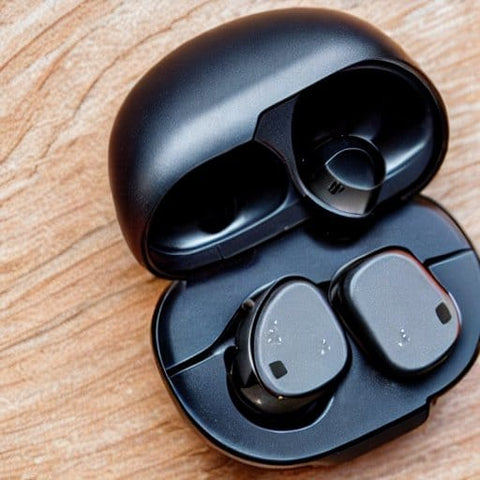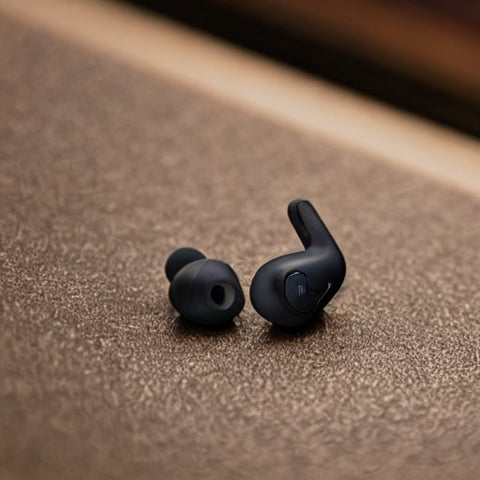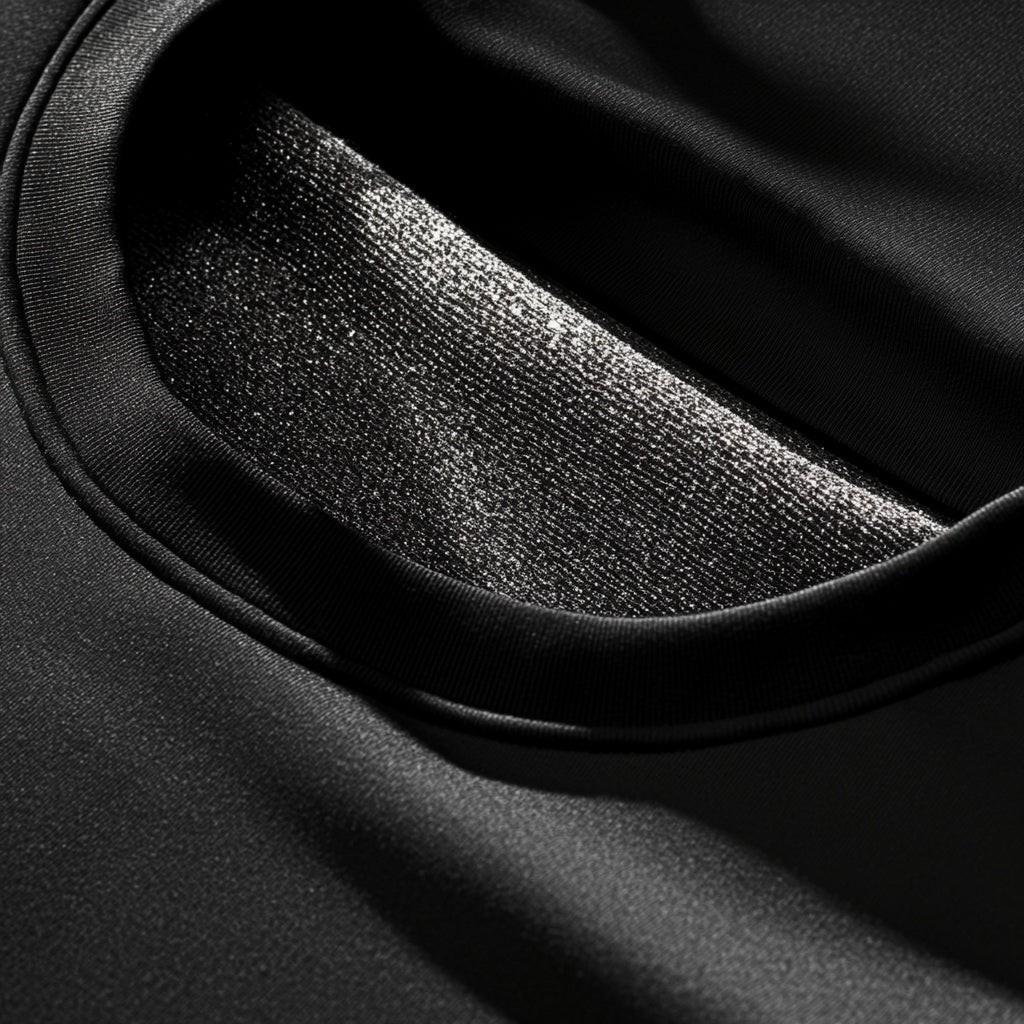Your Brain and Bluetooth
If you're concerned about the state of your mental health, you may be wondering whether or not using bluetooth headphones is harmful to your brain. There have been some research done, and the results of those studies suggest that wearing Bluetooth headphones on a daily basis may or may not be harmful to one's brain. Before making a choice to purchase a Bluetooth headset, you should always be aware of the hazards that are associated with doing so and do appropriate research in this area. Some individuals say that they are sensitive to radio waves, while others assert that prolonged exposure to wireless radiation has a detrimental impact on their physical well-being.
The following are some of the possible adverse impacts on one's health that have been proposed:
- Elevated Risks: Research have shown a possible relationship between exposure to electromagnetic fields (EMFs) from Bluetooth devices and an elevated risk of cancer. This link has been proposed by some of these studies.
- Brain tumors: There have been some instances of persons who use Bluetooth headphones for extended periods of time developing brain tumors as a result of its usage. However, further study is required to establish whether or not the usage of Bluetooth devices is associated with an increased risk of developing brain tumors.
- Other symptoms: After using Bluetooth devices, some individuals have reported experiencing a number of other symptoms, including headaches, weariness, and skin irritation.
Bluetooth and EMF Health Aspects
The Bluetooth standard has quickly become an indispensable component of our day-to-day lives, allowing us to do anything from wirelessly stream music to link our smartphones to our vehicles. However, there is a rising worry regarding the possible health concerns connected with continuous exposure to the electromagnetic radiation released by Bluetooth devices. This issue stems from the fact that the level of electromagnetic radiation emitted by Bluetooth devices is increasing. In this article, we will discuss the many ways in which using Bluetooth technology may be detrimental to your health, as well as the steps that you may take to protect yourself from these potential dangers.
The Effects of Being Exposed to Electromagnetic Radiation
The potential for exposure to electromagnetic radiation is one of the most significant concerns raised by Bluetooth technology (EMR). The International Agency for Research on Cancer has identified electromagnetic radiation in the form of radio waves emitted by Bluetooth devices as having the potential to cause cancer in humans (IARC). Even though the amounts of electromagnetic radiation (EMR) given out by Bluetooth devices are typically thought to be rather low, chronic exposure to any level of MRE, regardless of how low, may still be detrimental.
There is evidence that electromagnetic radiation (EMR) is associated to a number of health concerns, including as cancer, genetic damage, and neurological disorders. EMR has also been demonstrated to disturb the normal electrical circuits of the body, which may result in a number of symptoms such as weariness, headaches, and difficulties focusing. This can lead to a variety of health problems.
Wellness of the Ear and the Brain
Another thing that makes many nervous about Bluetooth technology is the effect it might have on people's ears and brains. When Bluetooth earbuds are used, they are put straight into the ear canal. This may produce an environment that is warm and damp, which is perfect for the development of germs and fungus. This may make the risk of ear infections worse, particularly if the earbuds are not cleaned correctly or if they are used for lengthy periods of time.
Concerns have also been raised over the possibility that the electromagnetic radiation released by Bluetooth earphones might pass through the skull and have an effect on the brain. Studies have revealed that electromagnetic radiation (EMR) may induce changes in the electrical activity of the brain. These changes can lead to a range of neurological symptoms such as headaches, exhaustion, and difficulties focusing.
Sleep Disturbances
The effect that Bluetooth technology has on one's ability to get enough rest is yet another possible risk to one's health. Bluetooth devices give out electromagnetic radiation (EMR), which has the potential to interfere with the body's natural electrical circuits and the generation of melatonin, the hormone that controls sleep patterns. This may result in sleep problems such as insomnia, trouble falling asleep, and other issues with sleep.
Additionally, the blue light that is emitted by a variety of electronic gadgets, such as smartphones, tablets, and laptops, may interfere with the generation of melatonin and make it difficult to fall or stay asleep. This is especially troublesome for those who use their gadgets close to bedtime, since the blue light may inhibit melatonin synthesis, making it more difficult to fall asleep. This is especially problematic for people who use their devices close to bedtime.
How You Can Safeguard Yourself
There is cause for worry over the possible hazards to health that are related with the use of Bluetooth technology; nevertheless, there are actions you may take to protect yourself. The following are some suggestions that can assist you in lowering your exposure to EMR:
- Reduce the amount of time you spend using Bluetooth devices, particularly when you are in close proximity to another Bluetooth device.
- If you have the option, use wired headphones or speakers rather than equipment that use Bluetooth.
- When you are not making use of your Bluetooth device, turning it off can help limit the amount of electromagnetic radiation (EMR) you are exposed to.
- Keep your head, as well as your body, far clear of your phone and any other electronic equipment.
- When you make calls on your phone, using a headset or loudspeaker will limit the amount of electromagnetic radiation (EMR) that you are exposed to.
- You may lessen the quantity of blue light that is produced by your mobile device by installing an app or adjusting a setting on your phone.
Earphones that fit within the ear vs headphones
If you are thinking about purchasing a set of earphones, you should make sure you are aware of the potential adverse effects they might have on your hearing. However, despite their portability and ease of use, they are not without certain inherent dangers.
In addition to the risks associated with putting your ears in close proximity to wireless radiation, these headphones pose a risk of giving you an ear infection. They have the ability to enter the ear canal and collect moisture there. This may result in the development of germs as well as inflammation. Additionally, it may cause damage to the eardrum, which might result in an infection in the middle ear.
Using earbuds may also raise the likelihood of developing tinnitus, which is described as a ringing, buzzing, or other sound in the ear. This takes place if there is a rapid shift in the air pressure found within the ear.

Brian Fligor, an audiologist, has been doing study on the impact that earbuds have on the risk of hearing loss. He has discovered that using earbuds might cause a significant amount of damage to one's hearing, particularly in younger individuals.
More than one billion young people are at danger of losing their hearing, according to a research that was conducted by the World Health Organization. When compared to 20 years ago, this is a 30 percent increase.
Earbuds that do not need wires have been more widely available in the recent past. According to the findings of some researchers, they may raise the likelihood of developing brain cancer. However, many individuals are unaware of the long-term repercussions that are associated with the use of these devices.
Due to the limited amount of time available for research, experts are not particularly clear on the possible implications that using earphones might have on one's health. On the other hand, you do have some control over the dangers, and there are things you can do to mitigate them.
Your first order of business is to exercise caution with regard to the volume. In general, the danger increases in proportion to the volume of the music. Also, be sure that the earphones you wear are just on the exterior part of your ear. In the event that you do not, you risk experiencing pain or discomfort in your ear.
The next thing you need to do is clean your earphones. Earbuds that haven't been cleaned properly may be a breeding ground for skin irritants, as well as germs and fungus. Earbud cleaners and screen cleaning cloths are two other options for sanitizing them.
Look for wired earbuds if you want to get something that will serve you well for a significant amount of time.
Non-ionizing radiation
There is some evidence from research suggesting that using wireless headphones with Bluetooth might be detrimental to your brain. However, there is no evidence that can be taken as proof that they are. Despite this, there are many who are concerned about the gadgets' lack of safety.
You are in luck since there are a few steps you can do to reduce the amount of radiation that is released from your mobile device. The first thing you should do is to move the gadget away from your body whenever it is not being used. One other thing you may do is to converse on the phone while wearing headphones.
Bluetooth headphones emit minimal amounts of radiation, making them an ideal alternative for those who want to reduce the amount of radiation to which they are exposed. However, the technology is just a few decades old. Earbuds that are wireless have just been available to consumers for the last few years. As a result, there hasn't been a lot of study done on how their presence affects human health.
Although there are no particular studies that have indicated an increase in the risk of cancer among Bluetooth users, some observational studies have suggested an association between the two. Researchers found a relationship between the use of mobile phones and an elevated risk of meningioma in their study that was published in 2015.

In rats, a research conducted in 2020 discovered a connection between the gadget and the development of malignant brain tumors. They hypothesize that some natural phenomena, such as ionizing radiation, are able to take in electromagnetic energy emitted by a Bluetooth device.
Some researchers in the scientific community are of the opinion that the positive aspects of non-ionizing electromagnetic fields outweigh the negative aspects.
Researchers have also discovered that exposure to EMF for extended periods of time may lead to neurological and reproductive issues. In addition to this, it might impede one's ability to learn and remember things. Because of these factors, it is essential to get an understanding of the potential consequences that Bluetooth and other types of wireless technologies may have.
The International Electromagnetic Field Alliance asserts that Bluetooth headsets and other wireless goods release a wide range of nonionizing electromagnetic fields (EMFs). Radio waves, X-rays, and microwaves are all examples of these types of radiation.
Some individuals are nonetheless concerned about the effects that using wireless headphones and other Bluetooth devices might have on their health, despite the fact that the levels of non-ionizing EMR emitted by these devices are far lower than those emitted by mobile phones. We should be able to better comprehend the influence of low-frequency electromagnetic fields when more study is done on the topic.
Those suffering from hyperacusis and phonophobia
Both hyperacusis and phonophobia may be highly uncomfortable disorders since they can produce pain and other unpleasant sensations. Additionally, they might reduce the sufferer's overall quality of life. The good news is that there is a wide range of therapeutic options available to assist.
The first thing that has to be done is to figure out what causes hyperacusis. A physical examination could be used for this purpose. It is possible that the cause is a viral infection, a head injury, or a disorder that affects the central auditory processing center, such as Meniere's syndrome. A sense of fullness in the ears, pressure in the ears, and a heightened sensitivity to loud sounds are some of the most prevalent symptoms.
If the underlying reason can be determined, the patient may be sent to a specialist for treatment. Audiologists and doctors specializing in the ear, nose, and throat (ENT) are examples of these professionals.
The reduction of the individual's hearing sensitivity should be the end result of the therapy. In addition to this, it is essential to find effective ways to control the symptoms. The symptoms of hyperacusis may be made worse by anxious feelings as well as other emotional reactions to noises. Individuals who seek counseling may find that it assists them in overcoming their concerns and altering negative thinking habits.

Altering your way of living is another approach you might use to fight hyperacusis. A effective strategy to assist is to reduce the amount of exposure you have to loud sounds. You might also try covering your ears with headphones to muffle the surrounding noise. Also, discuss your problem with your loved ones and close friends.
It is possible that the number of persons who experience hyperacusis may surprise you. This disorder affects one person out of every thousand on average. Although it does not happen very often, it has the potential to significantly alter the way you live your life.
A person suffering from hyperacusis may also withdraw from social settings as a result of the condition. It is possible that this will not only make the symptoms of the condition worse, but it may also hinder the patient from engaging in the occupation of their choice.
A person who has this condition may not be able to hear any sound at all in certain instances. This may be especially difficult in situations involving sounds of a high pitch. Someone who suffers from hyperacusis may find that even a somewhat inconsequential sound is intolerable.
To alleviate some of the symptoms of hyperacusis, a patient may find that using a sound generator is helpful. Patients are instructed to wear an appliance that generates calming sounds while also working with a therapist to learn how to manage their responses to various noises.
Concerns Regarding Health
The possible health dangers linked with continuous exposure to the electromagnetic radiation released by the devices is a key cause for worry when it comes to the use of Bluetooth earphones. Even though the World Health Organization (WHO) has stated that the levels of radiation emitted by Bluetooth earbuds are generally too low to cause harm, some experts warn that prolonged exposure to even low levels of radiation can still be harmful.When Bluetooth earbuds are used, they are put straight into the ear canal. This may produce an environment that is warm and damp, which is perfect for the development of germs and fungus. This may make the risk of ear infections worse, particularly if the earbuds are not cleaned correctly or if they are used for lengthy periods of time.
Other reasons to opt out of bluetooth earbuds:
Threats to One's Safety and Privacy
Earbuds that connect through Bluetooth should be avoided for the additional reason that using such devices may expose users to security and privacy threats. Bluetooth is a wireless technology that transmits data at 2.4 GHz, the same frequency that is used by a wide variety of other devices, such as Wi-Fi routers, microwaves, and cordless phones. Because of this, Bluetooth devices are susceptible to hacking and other types of interference, both of which may put the confidentiality of your personal information at risk.
In addition, Bluetooth earphones are often associated with cellphones, computers, and other electronic devices that hold sensitive information such credit card numbers, passwords, and personal contact information. An adversary might have access to this information if your Bluetooth earphones are hacked, which could result in identity theft or other types of financial crime.
Connectivity Issues
The possibility of experiencing connection troubles is yet another significant drawback of Bluetooth earphones. Bluetooth is a kind of wireless technology that requires two devices to be connected in order to function. However, other devices that operate on the same frequency as this one, such as cordless phones, microwaves, and Wi-Fi routers, might readily interfere with this connection and cause it to malfunction. This might result in lost connections, static, or other types of interference, making it challenging to listen to music or receive calls when on the go.
Additionally, Bluetooth earbuds often have a restricted range, which means that in order to have a steady connection with your smartphone, you may need to keep it within close proximity to the earphones themselves. This may be a significant nuisance, particularly if you are attempting to listen to music or accept phone calls while you are moving around.
Battery Capacity
The short lifespan of the battery is another another disadvantage of Bluetooth earphones. Bluetooth earbuds, in contrast to corded earphones, must depend on a battery in order to power the gadget. Because of this, in order to maintain the functionality of your earphones, you will need to charge them on a regular basis. Additionally, Bluetooth earbuds often have a shorter battery life than wired earphones, which may make it challenging to use them for lengthy periods of time. This is because traditional earphones are connected directly to a power source.
Cost
Last but not least, one of the most important reasons to steer clear of Bluetooth earphones is due to the price. Bluetooth earbuds often cost more than corded earphones, which makes them less accessible to a greater number of individuals due to their higher price point. In addition, if you damage or lose your Bluetooth earphones, you will be required to buy a new set, which might be a considerable financial strain for you.

























































Leave a comment